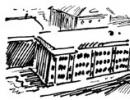Who said they steal radishchev. “If I fall asleep and wake up in a hundred years and they ask me what is happening in Russia now, I will answer - they drink and steal” (c). The writer who saw the future
In Russian literature, M.E. Saltykov-Shchedrin is given a special place, because not a single writer in his works criticizes, ridicules or exposes reality so aptly and mercilessly.
The following are the top 30 quotes from his writings; their characters so accurately characterize modern world that it seems the writer just looked into the future and wrote about us:
1. If I fall asleep and wake up in a hundred years and they ask me what is happening in Russia now, I will answer: they drink and steal ...
2. I wanted something: either a constitution, or stellate sturgeon with horseradish, or to skin someone.
3.All countries railways they serve for transportation, and in our country, moreover, for theft.
4. When and what kind of bureaucrat was not convinced that Russia is a pie to which you can freely approach and have a bite?
5.Russian government should keep her people in a state of perpetual amazement.
6. It's still nothing that in Europe they give one fifty kopecks for our ruble, it will be worse if they start punching us in the face for our ruble.
7. If in Holy Russia a person begins to be surprised, then he will be dumbfounded in surprise, and so he will stand like a pillar to death.
8. The strictness of Russian laws is mitigated by the optionality of their implementation.
9. Well, with us, brother, it’s not like that. We would have not only eaten apples, but the branches would have broken off everything! Here, the other day, Uncle Sofron walked past a mug of kerosene - and he drank it all!
10. We do not have a middle ground: either in the snout or the handle, please!
11. No, apparently, there are corners in God's world where all times are transitional.
12.- Mon cher, - used to say Krutitsyn, - divide everything equally today, and tomorrow inequality will still come into its own.
13. Alas! not even a quarter of an hour had passed, and already it seemed to me that now was the best time to drink vodka.
14.- Today, mother, even without a husband it’s the same as living with a husband. Nowadays, religions are laughing at the prescriptions. We reached the bush, got married under the bush - and it's in the bag. This is what they call civil marriage.
15. In order to steal successfully, you need to have only agility and greed. Greed is especially necessary, because petty theft can lead to prosecution.
16 .... In large letters, completely insignificant words were printed, and everything significant was depicted in the smallest font.
17. Every disgrace has its own propriety.
18 .... The purpose of issuing laws is twofold: some are issued for the great peoples and countries of order, others - so that the legislators do not stagnate in idleness.
19.- The young lady is asked whether to wash their neck for a large or small neckline?
20. Implement education with moderation, avoiding bloodshed as much as possible.
21. Idiots in general are very dangerous, and not even because they are necessarily evil, but because they are alien to all considerations and always go ahead, as if the road on which they found themselves
belongs to them alone.
22.- Credit, - he explained to Kolya Persianov, - is when you don't have money... you understand? There is no money, and suddenly - klats! - they are!
- However, mon cher, if they demand payment? - burred Kolya.
- Freak! You don't even understand such a simple thing! You have to pay - well, and again a loan! More to pay - more credit! Today, all states live like this!
23. Stupid, in the rough sense of the word, Strunnikov could not be called, but he was only smart enough to, as they say, not to eat tallow candles and not to wipe himself with glass.
24. Talkativeness hides lies, and lies, as you know, are the mother of all vices.
25. One hosts another and thinks: “With what pleasure I would throw you, chicken son, out of the window, if only ...”, and the other sits and also thinks: “With what pleasure I would spit
you, vile fawn, in the face, if only ... "Imagine that this" if "does not exist - what an exchange of thoughts would suddenly take place between the interlocutors!
26. Those who think that only those minnows can be considered worthy citizens, who, mad with fear, sit in holes and tremble, believe incorrectly. No, these are not citizens, but at least useless minnows.
27. In the words “not seen in anything” there is already a whole reputation that will not allow a person to plunge into the abyss of absolute obscurity without a trace.
28. Many tend to confuse two concepts: "Fatherland" and "Your Excellency."
29. It's scary when a person speaks and you don't know why he says what he says and whether he will ever finish.
30. Talent in itself is colorless and acquires color only in application.
Reviews
Many of Saltykov-Shchedrin's observations are ineradicable. But if, at least, officials learn the truth: "Every disgrace has its own decency," then this will be a huge progress. But such officials need to be brought up and taught, because they will not appear just like that.
Mikhail Evgrafovich Saltykov-Shchedrin has a special place in Russian literature, because not a single writer in his works criticizes, ridicules or exposes reality so aptly and mercilessly.
Despite the fact that he wrote almost two centuries ago, his stories are very similar to what is happening in Russia now. The heroes characterize the modern world so accurately that it seems that the writer just looked into the future and wrote about us.
- If I fall asleep and wake up in a hundred years and they ask me what is happening in Russia now, I will answer: they drink and steal ...
- I wanted something: either a constitution, or stellate sturgeon with horseradish, or ripping off someone.
- In all countries railroads are used for transportation, but in our country they are also used for theft.
- When and what bureaucrat was not convinced that Russia is a pie to which one can freely approach and have a snack?
- The Russian government must keep its people in a state of constant amazement.
- It's still nothing that in Europe they give one fifty kopecks for our ruble, it will be worse if they start punching us in the face for our ruble.
- If in Holy Russia a person begins to be surprised, then he will be dumbfounded in surprise, and so he will stand like a pillar to death.
- The severity of Russian laws is mitigated by the optionality of their implementation.
- Well, we have, brother, not so. We would have not only eaten apples, but the branches would have broken off everything! Here, the other day, Uncle Sofron walked past a mug of kerosene - and he drank it all!
- We do not have a middle ground: either in the snout or the pen, please!
- No, apparently, there are corners in God's world where all times are transitional.
- “Mon cher,” Krutitsyn used to say, “divide everything equally today, and tomorrow inequality will still come into its own.
- Alas! A quarter of an hour had not yet passed, and already it seemed to me that now was the right time to drink vodka.
- “Today, mother, even without a husband it’s the same as living with a husband. Nowadays, religions are laughing at the prescriptions. We reached the bush, got married under the bush - and it's in the bag. This is what they call civil marriage.
- In order to steal successfully, you only need to have agility and greed. Greed is especially necessary, because petty theft can lead to prosecution.
- ... Words completely insignificant were printed in large letters, and everything essential was depicted in the smallest font.
- Every ugliness has its own decency.
- ... The purpose of issuing laws is twofold: some are issued for the great peoples and countries of order, others - so that the legislators do not stagnate in idleness.
- - The young lady is asked whether to wash their neck for a large or small neckline?
- Enlightenment should be introduced with moderation, avoiding bloodshed as much as possible.
- Idiots in general are very dangerous, and not even because they are necessarily evil, but because they are alien to all considerations and always go ahead, as if the road on which they found themselves belongs to them alone.
- - A loan, - he explained to Kolya Persianov, - is when you have no money ... you understand? There is no money, and suddenly - klats! - they are!
- However, mon cher, if they demand payment? - burred Kolya.
- Freak! You don't even understand such a simple thing! You have to pay - well, and again a loan! More to pay - more credit! Today, all states live like this! - Stupid, in the rough sense of the word, Strunnikov could not be called, but he was only smart enough to, as they say, not to eat tallow candles and not to wipe himself with glass.
- Loquacity hides lies, and lies, as you know, are the mother of all vices.
- One receives the other and thinks: “With what pleasure I would throw you, chicken son, out of the window, if only ...”, and the other sits and also thinks: “With what pleasure I would spit in your face, you vile fawn, if only ... "Imagine that this" if "does not exist - what an exchange of thoughts would suddenly occur between the interlocutors!
- Those who think that only those scribblers can be considered worthy citizens who, mad with fear, sit in holes and tremble, believe incorrectly. No, these are not citizens, but at least useless scribblers.
- The words “not seen in anything” already contain a whole reputation that will in no way allow a person to plunge into the abyss of absolute obscurity without a trace.
- Many tend to confuse two concepts: "Fatherland" and "Your Excellency."
- It's scary when a person speaks and you don't know why he says what he says and whether he will ever finish.
- Talent itself is colorless and acquires color only in application.
This year marks 460 years since the first bribe taker was punished in Russia
Bribes, which have become a real disaster for us, have appeared since time immemorial. A certificate dated 1556 has been preserved, in which a certain clerk is mentioned, who "accepted a goose stuffed with coins, taking too much promise." The retribution was terrible - the poor fellow was sentenced to a painful execution.
This happened during the time of Ivan the Terrible, who was known as an active and, most importantly, effective fighter against bribery. Under him, many servants of the sovereign "lost their lives and patrimonies from their acquisition." During the 37 years of his reign, the tsar ordered the public execution of more than 8,000 offending officials.
“Muscovy is unrecognizable - the fear of death has changed this country so that our merchants now do not know how to conduct business,” wrote the French diplomat Arnold Shemo in 1558. “Even the local princesses do not take gifts, because every day the bribe-takers are publicly cut to pieces right on the city square.”
But after the death of Ivan the Terrible, the bribe-takers breathed a sigh of relief. Bribery has again become commonplace, although almost all rulers subsequently fought against it.
An astronomical amount has accumulated if it were possible to count all the bribes for at least the last two centuries.
In the Russian Empire, bribery has reached the highest levels of power. In 1915, Vladimir Sukhomlinov was removed from the post of Minister of War. The venerable, decorated general of the cavalry - one Russian orders the noble military man had a whole dozen - they were accused of disgusting supply of the Russian army, who fought on the fronts of the First World War, treason and bribery. But Sukhomlinov was arrested not immediately, but in 1916. He was tried and sentenced to indefinite hard labor. However, the general was released under an amnesty, as a citizen who had reached the advanced age of 70 years. It is curious that the rescue of Sukhomlinov from captivity took place already under Soviet power, in 1918 ...
Corruption, when there was no such word in the lexicon of law enforcement officers and bailiffs, flourished in the Russian Empire. Once, Russian emigrants asked Nikolai Karamzin, who had arrived abroad, to tell them in a nutshell what was happening at home. The writer needed only one thing - "They steal ...".
With the help of the Third Gendarme Department, Nicholas I decided to find out which of the 58 governors did not take bribes. Only two of them were found - Kovno governor Afanasy Radishchev, son famous writer, and Kyiv - Ivan Fundukley.
The tsar did not take any measures and only succinctly commented on the information: “It is understandable that Fundukli does not take bribes, because he is very rich, but if Radishchev does not take them, then he is too honest.”
It seems that the emperor was surprised not by the huge number of money-grubbers, but by the fact that in their dark environment there are still decent people. Nicholas I generally treated the plunderers of capitalist property with humor, once saying that in Russia only he, well, the heir to the throne, does not steal.
Kursk governor Arkady Nelidov also did not take bribes and led an honest, righteous life. However, he did not win the respect of the nobility and merchants. The ill-wishers grumbled: “Well, what's the point that he doesn't take bribes? But you can’t do anything with him!”
The governor of Western Siberia, Ivan Pestel, the father of the Decembrist Pavel Pestel, became notorious. Alexander Herzen wrote that he "brought open, systematic robbery in the entire region, cut off by his scouts from Russia." According to the memoirs of the writer Nikolai Grech, “Siberia groaned under the cruelest yoke. Pestel surrounded himself with villains and swindlers: the first of them was Nikolai Ivanovich Treskin, the civil governor of Irkutsk.
In fairness, it should be noted that Nicholas I, trying to fight mass bribery, introduced regular financial checks at all levels. This event became the basis of Nikolai Gogol's comedy The Inspector General.
At the end of the reign of Nicholas I, 2540 officials were on trial. A lot, but also a little on the scale of boundless Russia. Historian Vasily Klyuchevsky wrote: “In the province he (Nicholas I - V.B.) sent out trusted dignitaries to produce a strict audit. Terrifying details were revealed; it turned out, for example, that in St. Petersburg, in the center, not a single cash desk had ever been checked; all financial statements were deliberately false; several officials with hundreds of thousands are missing…”
At the last Russian emperor Nicholas II, financial crimes reached unprecedented proportions. In 1904, the Russkiy Mir magazine published an article on the topic of the day, which said: “Truly, “from the cold Finnish rocks to the fiery Colchis”, senatorial revisions and newspaper revelations open vast nests of large, fat, pumped money of bribe-takers, and around them circle strings of smaller, more modest, skinnier bribe-takers. Near each state chest, on which the auditor's searching gaze falls, there is a greedy crowd of bribe-givers and bribe-takers, and the lid of this chest is hospitably opened to people who managed at the appropriate moment to give the corresponding person the appropriate bribe.
In 1911, the Minister of Justice, Ivan Shcheglovitov, submitted to the State Duma a draft law "On the Punishment of Ligodeliya", in which giving a bribe was considered an independent crime. However, this paper was not destined to become a state document. Is it not because the legislators themselves had a stigma in the cannon?
The year 1917 was approaching. Russian empire moaned, creaked, staggered - its foundations were inexorably corroded by the short-sighted policy of the autocracy, huge spending on the war, the intrigues of the revolutionaries and, of course, the old disease - widespread corruption. In the end, everything ended tragically ...
Perhaps the most effective fighter against corruption in Soviet power was Stalin. He managed to reduce theft at least at the state level to a minimum. Then, however, everything returned to normal.
Today, according to the candidate of legal sciences Sergei Pashin, the venality of politicians, officials, judges, members of the selection and competitive commissions has become an integral feature of Russian life.
Almost every day we are told about high-profile revelations. The governor of Nenets was convicted autonomous region Alexei Barinov and head of the Bryansk region Nikolai Denin. Under investigation are the governors of Sakhalin, Komi, Kirov and Novosibirsk regions - Alexander Khoroshavin, Vyacheslav Gaiser, Nikita Belykh, Vasily Yurchenko. Accusations were made against the former heads of the Tula, Amur, Irkutsk regions - Vyacheslav Dudka, Leonid Korotkov, Alexander Tishanin ...
Compared to the current bribe-takers, the bribe-takers of the past years are real lambs. For example, in the 19th century, the Pskov governor Fyodor Bartolomey extorted bribes of "only" several thousand rubles, the head of Eastern Siberia, Wilhelm Rupert, "dabbled" in the same way. Today, the thieves' account is no longer in the millions, but in the billions.
So the other day, the first acting minister in Russia, Alexei Ulyukaev, was arrested for a bribe of $ 2 million. Immediately a new expression appeared - "Ulyukaevshchina". It is possible that the Russian language will be enriched with similar ones. Today, no one is surprised by the numerous criminal cases against Roskosmos, Oboronservis, Rosreestr, Rosnano and other departments with their numerous defendants and huge money that disappears “somewhere”.
With these funds, it would be possible not only to equip Russia, but also to achieve the prosperity of its people. What's the point of dreaming? Maybe it's time to tighten the screws?
Especially for "Century"
and they will ask me what is happening in Russia now, I will answer - they drink and steal.
Mikhail Evgrafovich Saltykov-Shchedrin.
The Saltykov-Shchedrin Prize was established by the government of the Kirov Region in 2012 and will be awarded annually to creative workers for the creation of a literary work (books, publications in print and periodicals) in the genre of satire, consonant with the creative ideas of the outstanding Russian writer. It is personal in nature and is awarded to one applicant. The amount of the award is 100 thousand rubles.
The date of the first presentation of the award was timed to the moment of the writer's exile to Vyatka and took place on April 28 of this year.
By the decision of the commission, the diploma of the laureate of the Saltykov-Shchedrin Prize is awarded to Olga Vladimirovna Smirnova (Lukas) for the creation of a literary work - "A new curb from a curb stone",
Olga Lukas was born in Leningrad in 1979. Published in various editions of Moscow and St. Petersburg. Graduated from the Faculty of Journalism of St. Petersburg State University. In 2003 she moved to Moscow. The first story was published in the literary supplement to Nezavisimaya Gazeta in 2001. Also, the stories were published in collections edited by Max Fry and in the collection "Prologue. Young Literature of Russia" (2004). The first independent book "Cinderella on the Edge" (2007) was shortlisted for the "Chested Dream" award. For the Saltykov-Shchedrin Prize, the publishing house "COMILFO" (St. Petersburg) nominated the book "A New Curb of Curb Stone".
"If I fall asleep and wake up in a hundred years and they ask me what is happening in Russia now, I will answer - they drink and steal."
Mikhail Evgrafovich Saltykov-Shchedrin
Other articles in the literary diary:
- 30.04.2012. If I fall asleep and wake up in a hundred years
- 04/16/2012. Quotes. Ann Dia and more...
- 04/05/2012. Viktor Ganchar. Copyright. Quotes.






